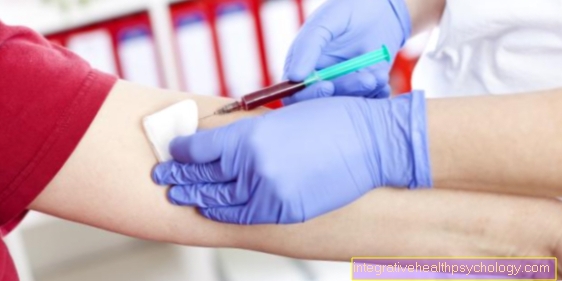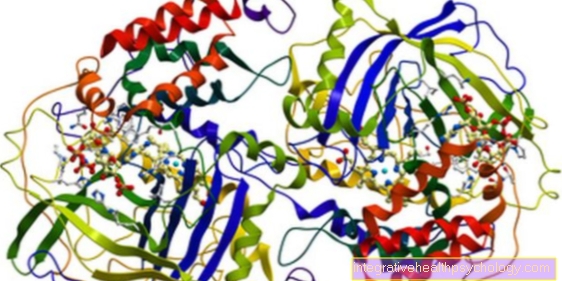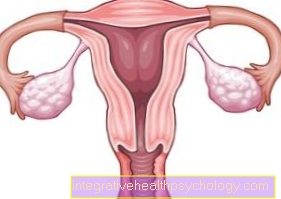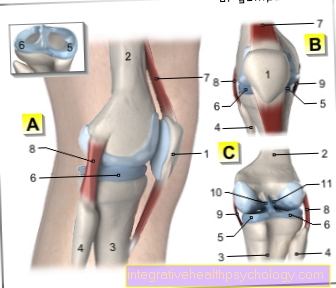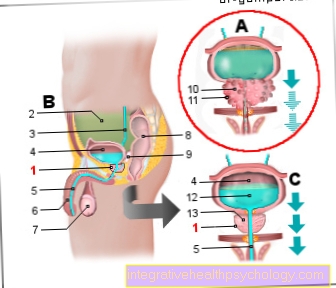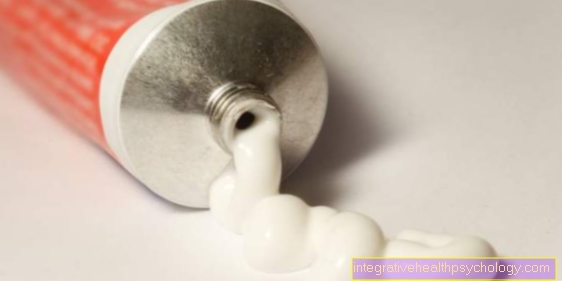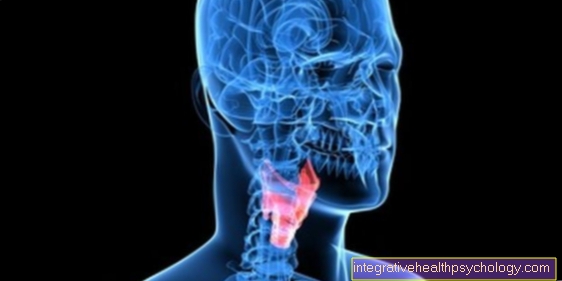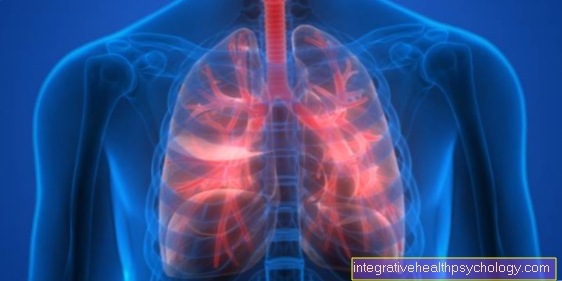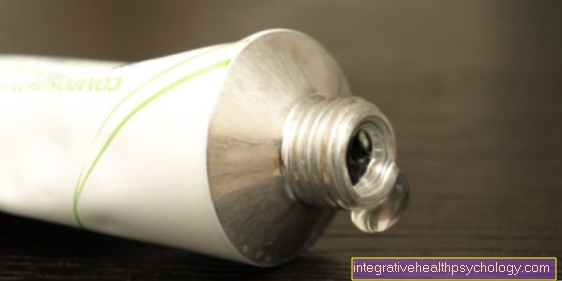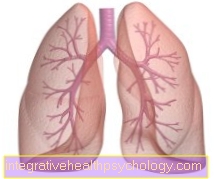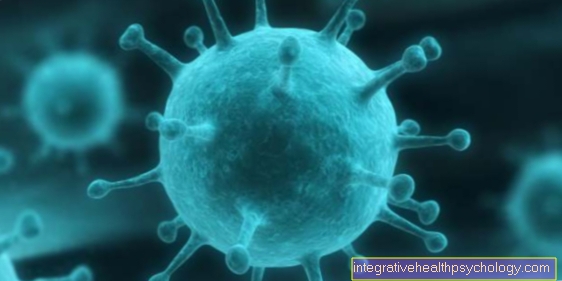Somatotropin
Synonyms
Somatotropic hormone, somatropin, growth hormone
Abbreviations
STH or GH
definition
Somatotropin is a hormone produced in the human body that influences and promotes growth and metabolism. It is water-soluble and is composed of 191 amino acids. Somatotropin is produced in the pituitary gland of the human brain, more precisely in what is known as the "anterior pituitary gland".
Also read more on the topic: Growth spurt.

As an important metabolic hormone, it is part of a complex control loop. Its production is influenced by a number of different other hormones and receptors, its release is regulated and its effect on many different organs is converted into further biochemical processes.
Its primary functions are Growth of cells and thus the stimulation of body growth, especially of newborns and adolescents. The hormone does this via a Release of insulin, one Increase in the level of sugar in the blood, the Structure of amino acids and about the Breakdown of fats.
The release of the hormone from the pituitary gland is in turn controlled by hormones, on the one hand by its opponent Somatostatin, which inhibits its distribution, on the other hand through the Somatoliberin (SRF, GRH, GHRH), which favors the distribution.
As Growth hormone it is mainly released to a greater extent shortly after birth and during puberty. Signals that lead to the release of the hormone are exercise, fasting, psychological stress and hypoglycaemia. During fasting and hypoglycaemia, the stomach releases the hormone Ghrelin which can also release somatotropin immediately.
Its effect on muscles, liver, bones and cartilage is particularly important for the human body. This is where it works by attaching to the somatotropin receptor on the surface of the cells. Due to the increased uptake of amino acids and the formation of proteins in the target cells, it has important functions for proper growth, which enables normal life. Persists permanently Deficiency of somatotropin on the one hand it comes to decreased growth, increased body fat, reduced muscle mass and unstable bones, on the other hand, too increased risks for cardiovascular disease and one in general decreased quality of life.
Somatotropin used to treat various diseases
In medicine, somatotropin has been used as a drug since 1963. Various diseases and syndromes are associated with a reduced production or effect of somatotropin. Nowadays, man-made somatotropin is used to treat hormone deficiency. It can be used both in children who are short stature and in adults who suffer from severe hormone deficiency. Examples of hormone deficiencies in children are Prader-Willi syndrome and Turner syndrome. Side effects of ingestion are edema, headache, joint pain and muscle pain.
Outside of medicine, somatotropin is misused among strength athletes as a doping agent. It is popular among bodybuilders because of its muscle building properties. However, it is forbidden in professional sport and can only be purchased with a prescription. It is also widely touted as a weight loss cure. Another, but controversial side effect of somatotropin is the alleged anti-aging effect.
Non-medical use of somatotropin
The non-medical use of somatotropin is increasing in popularity in Germany. The target groups are very different depending on the desired effect. The non-medical benefits of somatotropin are no longer of interest only to bodybuilders. Building muscle is just one of the hormone's desired effects. A particularly large target group are now women and sometimes middle-aged men who take somatotropin in the form of globules use for weight loss and anti-aging.
On numerous websites on the Internet you can buy somatotropin globules for a lot of money with associated instructions on how to take them. An effect of the globules has not been scientifically proven. The active ingredient has been diluted to a “homeopathic dose” in many steps during production, so that it can no longer be detected.
Somatotropin as an insulin antagonist
Somatotropin has an opposite effect to insulin on body cells, for example in muscles, bones or adipose tissue. One denotes Somatotropin therefore also as Insulin antagonists. This action works by allowing somatotropin to bind to the somatotropin receptor on the target cells and cause another protein, the Insulin-like growth factor , will be produced. Insulin is also considered a growth factor, which has a so-called "anabolic" effect on the body cells, which means "building up". Because of these properties, insulin is used together with somatotropin and the somatomedins as an anabolic, which promotes muscle building.
Also read more on the topic: Insulin.
Somatostatin as an opponent of somatotropin
Somatostatin is just like the somatotropin water-soluble peptide hormone, which is composed of several amino acids. In contrast to the somatotropin, it is not found in the pituitary gland, but partially in the pancreas and produced in part by the hypothalamus. As the name suggests, somatostatin is functionally the most accurate Opponent of somatotropin. However, it also has important functions in the regulation of digestive hormones in the gastrointestinal tract. It inhibits the functioning of a long list of hormones. In digestion, this mainly leads to the production of gastric acid being stopped, bowel mobility restricted and digestive juices reduced.
Especially inhibits Somatostatin directly on the pituitary gland the release of somatotropin. An increased somatostatin level thus causes the consequences of a somatotropin deficiency in the long term.
In addition, somatostatin in the pancreas itself simultaneously inhibits the release of insulin and glucagon. This also corresponds to the exactly opposite effects of somatotropin and leads to a Decrease in blood sugar levels come here.
Artificial somatostatin can also be used medically and therapeutically. It has a supporting function in the Therapy of inflammation of the stomach and of pancreatitis . Here it has a gentle effect on the gastric and intestinal mucosa through the reduced production of the sometimes aggressive gastric and digestive juices.
Also read more on the topic: Somatostatin.
More information on somatotropin
More information on the topic Hormones can be found at:
- Endocrine system
- Pituitary gland
The following topics could be of interest to you:
- Growth spurt
- Anti-aging on the skin
- Acromegaly
An overview of all topics of the anatomy can be found at Anatomy A-Z.

